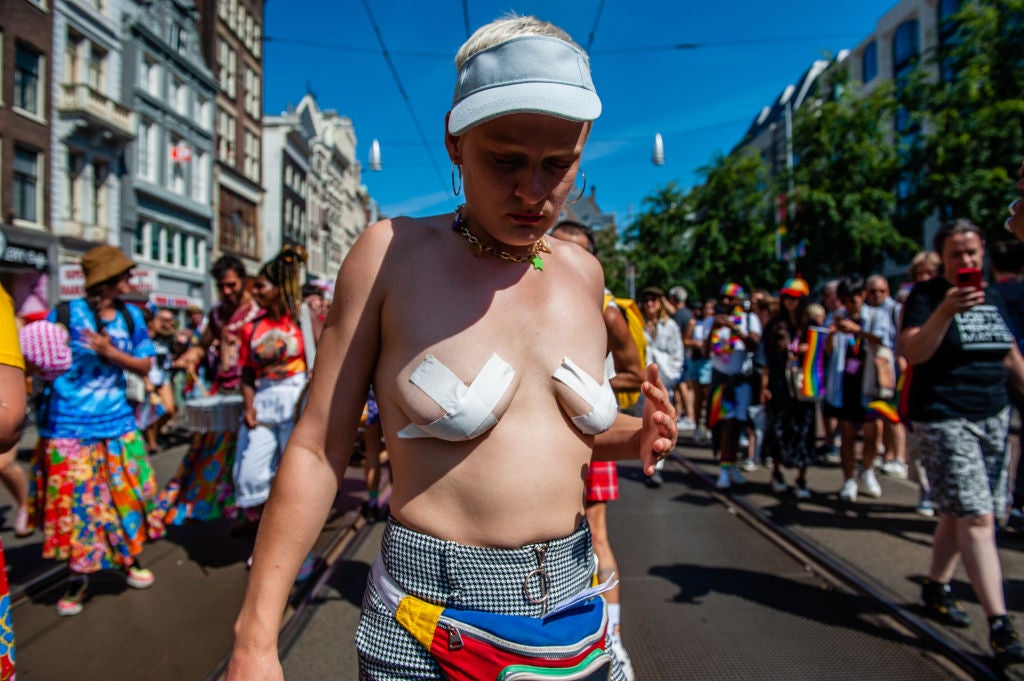
After more than a decade of being slightly prudish when it comes to the female anatomy, Meta might finally be allowing users to free their nipples online – bringing an end to one of the longest censorship debates in social media.
Last week it was reported that Meta had been told to “free the nipple” by its Oversight Board, which would mean lifting a ban on users posting bare breasts on Facebook and Instagram.
The recommendation focused on two recent censored Instagram posts by a transgender and non-binary couple, who shared images of themselves posing topless, but with their nipples covered, to raise awareness around top surgery.
Meta was told by the board that the “[old] policy is based on a binary view of gender and a distinction between male and female bodies,” which makes the rules about showing nipples “unclear” for those who do not identify as women.
The board recommended that Meta should “define clear, objective, rights-respecting criteria” when it comes to moderating nudity “so that all people are treated in a manner consistent with international human rights standards”.
Monica Horten, policy manager at Open Rights Organisation, told Verdict that she believes this is a “positive step to update Meta’s controversial and confusing policies.”
How well do you really know your competitors?
Access the most comprehensive Company Profiles on the market, powered by GlobalData. Save hours of research. Gain competitive edge.

Thank you!
Your download email will arrive shortly
Not ready to buy yet? Download a free sample
We are confident about the unique quality of our Company Profiles. However, we want you to make the most beneficial decision for your business, so we offer a free sample that you can download by submitting the below form
By GlobalDataHowever, she believes that the real issue is how Meta’s internal policies around nudity don’t match up with their publicly stated ones.
“The board’s decision highlights how Meta’s publicly stated policy on nudity is different from the internal guidance given to moderators,” Horten said.
“It’s yet another example of Meta’s divergent approach and it results in arbitrary and unfair decisions that don’t match users’ understanding of how the policy would operate.”
Meta’s community standards blog states that publishers and creators are not under any circumstances post: “Uncovered female nipples except in the context of breastfeeding, birth giving and after-birth moments, medical or health context, or an act of protest.”
This goes against the recent overturn from Meta, and many have been speaking out about the confusion.
A Meta representative said it “welcomes the board’s decision in this case” and confirmed the couple’s posts had been reinstated “prior to the decision”.
“We are constantly evolving our policies to help make our platforms safer for everyone,” the spokesperson added.
“We know more can be done to support the LGBTQ+ community, and that means working with experts and LGBTQ+ advocacy organisations on a range of issues and product improvements.”
Meta has 60 days to respond publicly to the board’s recommendations.
This is a noticeable win for women, many of whom have been fighting for over a decade to desexualise images of bare breasts; there is no ban forbidding men from showing their bald chests on Instagram or Facebook.
Throughout most of the 2000s, campaigners and self-proclaimed “lactivists” have been attempting to change the way images of breasts are viewed as sexual. It culminated ten years ago when the #FreetheNipple campaign took to the mainstream in 2013.
The campaign was seen everywhere, gaining high-profile support from the likes of Rhianna, Kim Kardashian, Jennifer Lawrence and more.
Ten years on the debate is still firing strong; Florence Pugh spoke out recently on the response to her nipples being on show on the red carpet.
“Of course, I don’t want to offend people, but I think my point is: how can my nipples offend you that much?”
Although this is definitely a win for campaigners, questions still remain on the effectiveness of Meta’s content-moderation system, which is operated automatically.
It is unclear how an artificial intelligence system will be able to tell the difference between a couple fundraising to afford top surgery and someone soliciting sex online.
“Context is everything, and algorithms are terrible at context,” Emily Bell, director of the Tow Center for Digital Journalism, said in conversation with The Guardian.
“The interesting question will be the tension over how Meta can create new rules without opening the floodgates to porn, which is why those rules exist in the first place. That ought to be possible, but I’m skeptical of whether it is if content moderation is automated.”
GlobalData is the parent company of Verdict and its sister publications.






